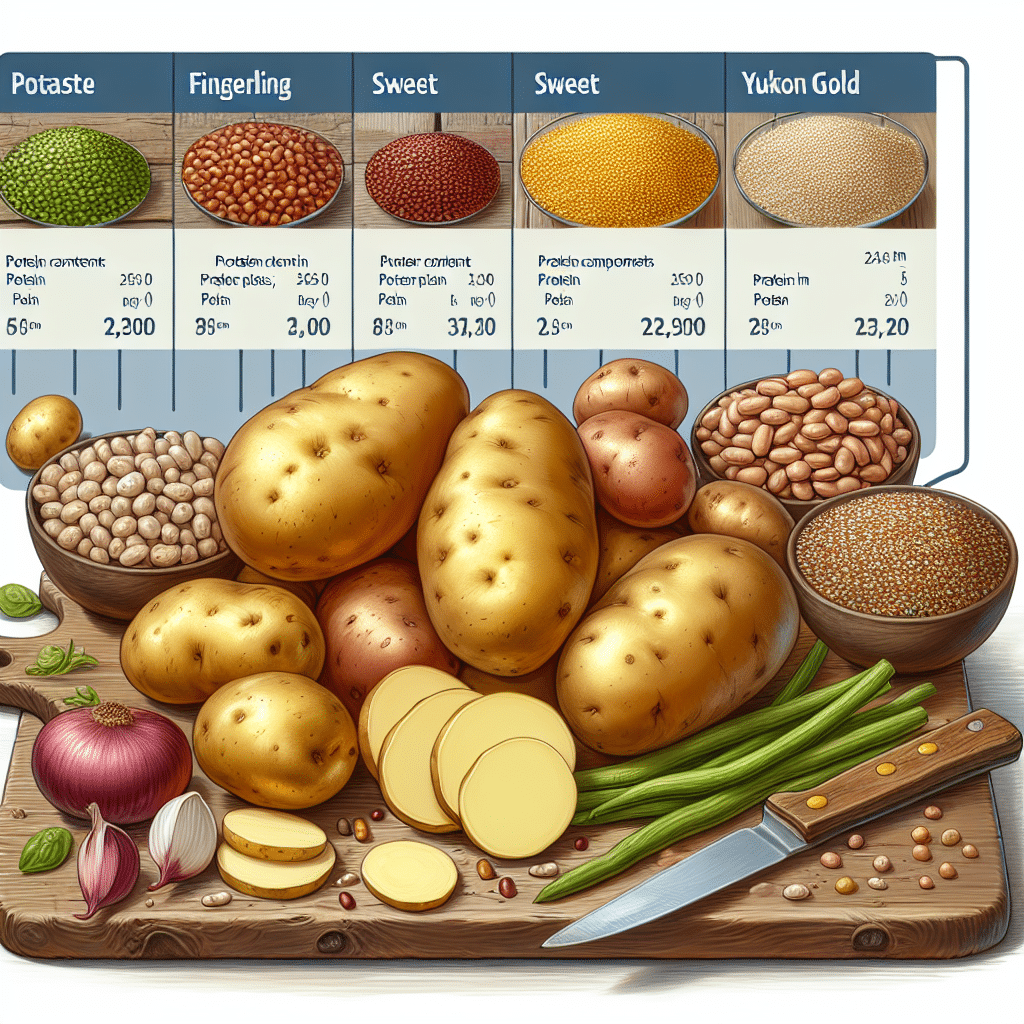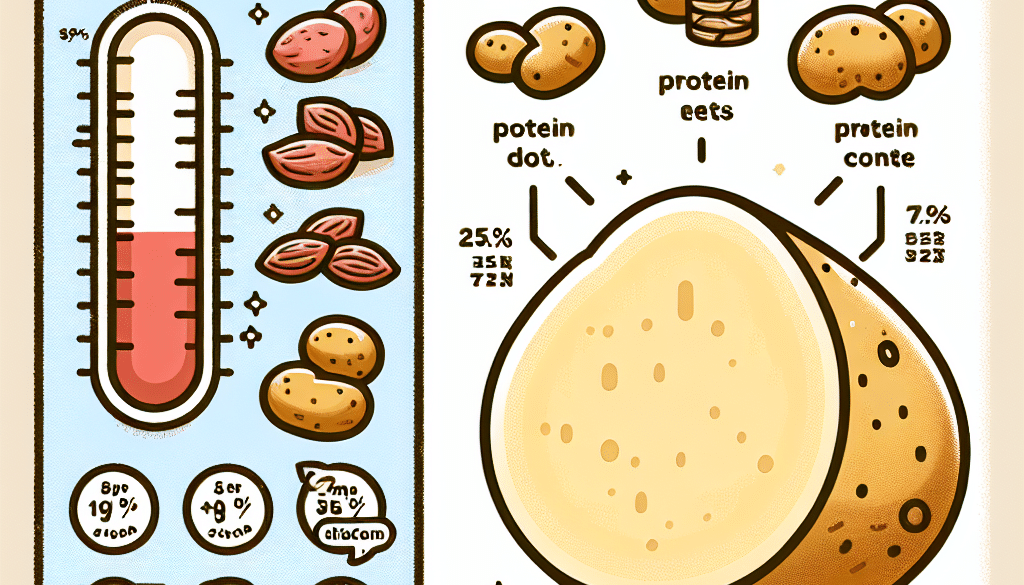Can You Get Enough Protein From Potatoes?
-
Table of Contents
- Protein Power: Can Potatoes Be Your Sole Source?
- The Nutritional Profile of Potatoes
- Understanding Protein Requirements
- Can Potatoes Meet Your Protein Needs?
- The Role of Potatoes in a Protein-Rich Diet
- Case Studies and Research
- Protein Quality in Potatoes
- Conclusion: Balancing Potatoes with Other Protein Sources
- Discover ETprotein’s Range of Protein Products
Protein Power: Can Potatoes Be Your Sole Source?

When it comes to protein, the usual suspects like meat, dairy, and legumes often dominate the conversation. However, the humble potato, a staple in many diets around the world, might not be the first food that comes to mind. But could this root vegetable be an underrated source of protein? This article delves into the potential of potatoes to meet your protein needs and whether they can stand alone as a sufficient protein source.
The Nutritional Profile of Potatoes
Potatoes are primarily known for their carbohydrate content, but they also contain a variety of other nutrients, including protein. A medium-sized potato (about 150 grams) contains approximately 4 grams of protein. While this might not seem like a lot, it’s important to consider the role that potatoes can play in a balanced diet.
Understanding Protein Requirements
The Recommended Dietary Allowance (RDA) for protein is 0.8 grams per kilogram of body weight per day for the average adult. This means that an individual weighing 68 kilograms (150 pounds) would need about 54 grams of protein daily. Athletes or those with higher muscle mass may require more protein, while sedentary individuals might need less.
Can Potatoes Meet Your Protein Needs?
To solely rely on potatoes for protein, one would have to consume an impractical amount. For example, to meet the 54 grams of protein RDA, our 150-pound individual would need to eat roughly 13.5 medium-sized potatoes per day. This is neither practical nor recommended, as it would lead to an excessive intake of carbohydrates and calories and a lack of other essential nutrients found in a varied diet.
The Role of Potatoes in a Protein-Rich Diet
While potatoes alone cannot provide enough protein for most people, they can contribute to the overall protein intake when combined with other protein sources. Here’s how potatoes can fit into a protein-rich diet:
- Complementary Proteins: Pairing potatoes with other plant-based proteins like beans or lentils can create a complete protein profile with all the essential amino acids.
- Dietary Diversity: Including potatoes in a diet that also features a variety of other protein sources, such as meat, fish, dairy, and nuts, ensures a well-rounded nutrient intake.
- Post-Workout Recovery: The combination of protein and carbohydrates in potatoes makes them a good post-exercise food for muscle recovery.
Case Studies and Research
Research has shown that a diet rich in plant-based foods can meet protein needs if a variety of sources are consumed. For example, a study published in the American Journal of Clinical Nutrition found that diets emphasizing plant-based protein sources can provide adequate nutrients while promoting health benefits.
Protein Quality in Potatoes
The quality of protein in potatoes is high, with a good balance of essential amino acids. However, it’s important to note that protein quality is not the only factor to consider when evaluating a food’s ability to meet protein needs. Quantity and the presence of other nutrients also play crucial roles.
Conclusion: Balancing Potatoes with Other Protein Sources
In conclusion, while potatoes contain protein and can be part of a protein-rich diet, they cannot be the sole source of protein for most individuals. A balanced diet that includes a variety of protein sources is essential for meeting nutritional needs. Potatoes can complement other protein-rich foods, contributing to a well-rounded and nutritious diet.
Discover ETprotein’s Range of Protein Products
If you’re looking to supplement your diet with high-quality protein sources, consider ETprotein’s range of organic bulk vegan proteins. Their products, including rice protein, pea protein, and various seed proteins, offer a neutral taste and are non-GMO and allergen-free. With L-(+)-Ergothioneine purity over 98%, ETprotein caters to a diverse range of industries and dietary preferences.
About ETprotein:
ETprotein, a reputable protein and L-(+)-Ergothioneine (EGT) Chinese factory manufacturer and supplier, is renowned for producing, stocking, exporting, and delivering the highest quality organic bulk vegan proteins and L-(+)-Ergothioneine. They include Organic rice protein, clear rice protein, pea protein, clear pea protein, watermelon seed protein, pumpkin seed protein, sunflower seed protein, mung bean protein, peanut protein, and L-(+)-Ergothioneine EGT Pharmaceutical grade, L-(+)-Ergothioneine EGT food grade, L-(+)-Ergothioneine EGT cosmetic grade, L-(+)-Ergothioneine EGT reference grade and L-(+)-Ergothioneine EGT standard. Their offerings, characterized by a neutral taste, non-GMO, allergen-free attributes, with L-(+)-Ergothioneine purity over 98%, 99%, cater to a diverse range of industries. They serve nutraceutical, pharmaceutical, cosmeceutical, veterinary, as well as food and beverage finished product distributors, traders, and manufacturers across Europe, USA, Canada, Australia, Thailand, Japan, Korea, Brazil, and Chile, among others.
ETprotein specialization includes exporting and delivering tailor-made protein powder and finished nutritional supplements. Their extensive product range covers sectors like Food and Beverage, Sports Nutrition, Weight Management, Dietary Supplements, Health and Wellness Products, and Infant Formula, ensuring comprehensive solutions to meet all your protein needs.
As a trusted company by leading global food and beverage brands and Fortune 500 companies, ETprotein reinforces China’s reputation in the global arena. For more information or to sample their products, please contact them and email sales(at)ETprotein.com today.














